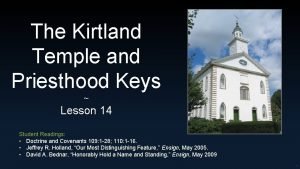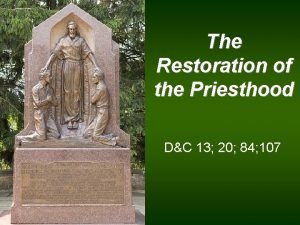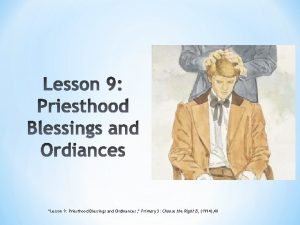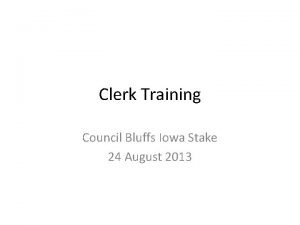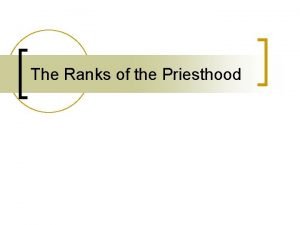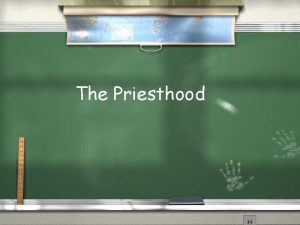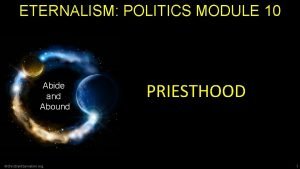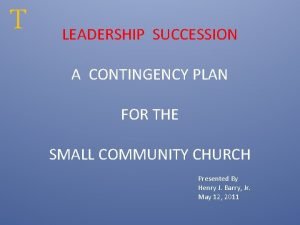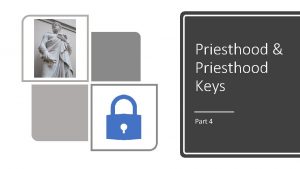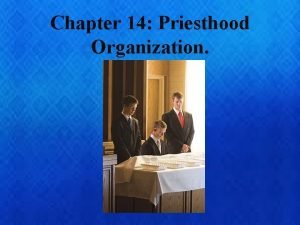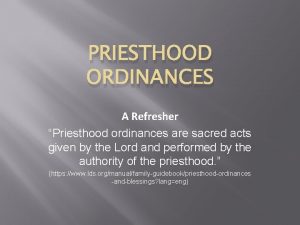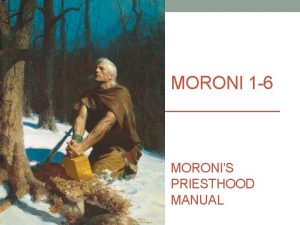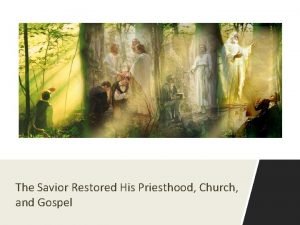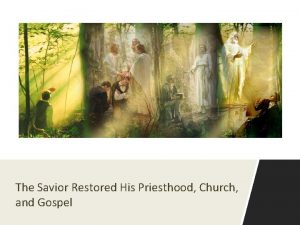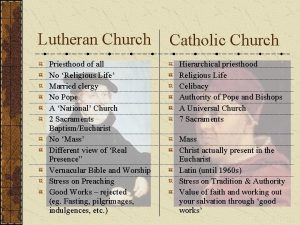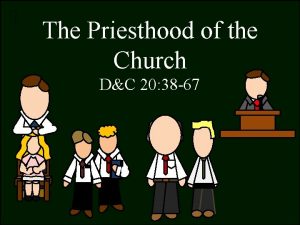Chapter 19 Priesthood Leadership in the Church of









- Slides: 9

Chapter 19: Priesthood Leadership in the Church of Jesus Christ “The Lord is watching over this work. This is His kingdom. We are not as sheep without a shepherd. We are not as an army without a leader. ”

From the Life of Gordon B. Hinckley President Gordon B. Hinckley recalled: “My first responsibility in the Church, the first office I ever held, was counselor to the boy who presided over our deacons quorum. Our good bishop called me in and talked with me about this calling. I was tremendously impressed. I was worried and concerned. I was by nature, believe it or not, a rather shy and backward boy, and I think this call to serve as a counselor in a deacons quorum was of as much concern to me, in terms of my age and experience, as is my present responsibility in terms of my age and experience. ” 1 On April 1, 1995, President Hinckley spoke in the priesthood session of general conference after Church members had sustained him for the first time as their prophet and President. For the previous 14 years, he had served as a counselor to three other Presidents of the Church. He had repeatedly testified of their divine callings and urged the Latter-day Saints to follow their counsel. Now, finding himself in that position, his feelings of dependence on the Lord were not diminished from the time he was a deacon or a newly called Apostle. Rather, he had become even more aware of his need for the Lord’s sustaining strength. He said: “Your uplifted hands in the solemn assembly this morning became an expression of your willingness and desire to uphold us, your brethren and your servants, with your confidence, faith, and prayer. I am deeply grateful for that expression. I thank you, each of you. I assure you, as you already know, that in the processes of the Lord, there is no aspiring for office. As the Lord said to His disciples, ‘Ye have not chosen me, but I have chosen you, and ordained you’ (John 15: 16). This office is not one to be sought after. The right to select rests with the Lord. He is the master of life and death. His is the power to call. His is the power to take away. His is the power to retain. It is all in His hands.

The Lord calls each President of the Church after testing, refining, and polishing him. My dear friends in the gospel, this is God’s work. This is his Church and the Church of his Beloved Son whose name it carries. God will never permit an imposter to stand at its head. He will name his prophets, and he will inspire and direct them. 4 Some express concern that the President of the Church is likely always to be a rather elderly man, to which my response is, “What a blessing!” … He does not need to be youthful. He has and will continue to have younger men to travel over the earth in the work of the ministry. He is the presiding high priest, the repository of all of the keys of the holy priesthood, and the voice of revelation from God to his people. To my mind there is something tremendously reassuring in knowing that … we shall have a President who has been disciplined and schooled, tried and tested, whose fidelity to the work and whose integrity in the cause have been tempered in the forge of service, whose faith has matured, and whose nearness to God has been cultivated over a period of many years. 5 Why do we need living prophets? What impresses you about the Lord’s “refining process” for preparing and calling a President of the Church?

When a President of the Church dies, the senior Apostle becomes the next President. Transition of authority [to a new President of the Church], in which I have participated a number of times, is beautiful in its simplicity. It is indicative of the way the Lord does things. Under His procedure a man is selected by the prophet to become a member of the Council of the Twelve Apostles. He does not choose this as a career. He is called, as were the Apostles in Jesus’ time, to whom the Lord said, “Ye have not chosen me, but I have chosen you, and ordained you. ” (John 15: 16. ) The years pass. He is schooled and disciplined in the duties of his office. He travels over the earth in fulfilling his apostolic calling. It is a long course of preparation, in which he comes to know the Latter-day Saints wherever they may be, and they come to know him. The Lord tests his heart and his substance. In the natural course of events, vacancies occur in that council and new appointments are made. Under this process a particular man becomes the senior Apostle. Residing latent in him, and in his associate Brethren, given to each at the time of ordination, are all of the keys of the priesthood. But authority to exercise those keys is restricted to the President of the Church. At [the prophet’s] passing, that authority becomes operative in the senior Apostle, who is then named, set apart, and ordained a prophet and President by his associates of the Council of the Twelve. Why is it important to know that the President is chosen according to “a divine plan which provides inspired and tested leadership”?

The Lord has provided principles and procedures for governing His Church if the President is not able to function fully. President Hinckley made the following statement in 1992, when he was serving as First Counselor in the First Presidency: The head of the Church is the Lord Jesus Christ. It is His Church. But the earthly head is our prophet. Prophets are men who are endowed with a divine calling. Notwithstanding the divinity of that calling, they are human. They are subject to the problems of mortality. Let it be understood by all that Jesus Christ stands at the head of this church which bears His sacred name. He is watching over it. He is guiding it. Standing at the right hand of His Father, He directs this work. His is the prerogative, the power, the option to call men in His way to high and sacred offices and to release them according to His will by calling them home. He is the Master of life and death. I do not worry about the circumstances in which we find ourselves. I accept these circumstances as an expression of His will. I likewise accept the responsibility, acting with my Brethren, to do all we can to move forward this holy work in a spirit of consecration, love, humility, duty, and loyalty. 10 What principles and procedures has the Lord established for governing the Church if the President is not able to function fully in all his duties?

Apostles are special witnesses of the name of Christ in all the world. After [being] ordained to the holy apostleship and … set apart as members of the Council of the Twelve, [Apostles are] expected to devote themselves primarily to the work of the ministry. They … place first in their lives, above all other considerations, the responsibility to stand as special witnesses of the name of Christ in all the world. I give witness to their brotherhood, to their devotion, their faith, their industry, and their tremendous service in advancing the kingdom of God. 11 How do latter-day Apostles show concern for all of God’s children, “both those within the Church and those out of the Church”? The Quorum of the Twelve Apostles, 1965. How have you benefited from the teachings of living prophets and apostles?

The First Presidency and the Twelve seek revelation and total harmony before they reach decisions. No decision emanates from the deliberations of the First Presidency and the Twelve without total unanimity among all concerned. At the outset in considering matters, there may be differences of opinion. These are to be expected. These men come from different backgrounds. They are men who think for themselves. But before a final decision is reached, there comes a unanimity of mind and voice. D&C 107: 27, 30– 31 What can we learn from the way they reach decisions? How can we apply these principles in our families and in the Church?

A stake president is called by inspiration to serve as an adviser to bishops and a leader for the people. The president of the stake is the officer called under revelation to stand between the bishops of wards and the General Authorities of the Church. It is a most important responsibility. He is trained by the General Authorities, and in turn he trains the bishops. The stake president serves as an adviser to the bishops. Every bishop knows that when he has to deal with a difficult problem there is one readily available to whom he may go to share his burden and receive counsel. He provides a secondary measure of safety in determining those worthy to go to the house of the Lord. … The president likewise becomes a second screen in determining the worthiness of those who go out to represent the Church in the mission field. He too interviews the candidate, and only when he is satisfied of his or her worthiness does he endorse the recommendation. He likewise has been given authority to set apart those called on missions and to extend releases when they have completed their service. What do you learn about the callings of stake president and bishop?

Bishops are shepherds of the flock. The bishops of the Church … are in a very real sense the shepherds of Israel. Everyone [in the Church] is accountable to a bishop or a branch president. Tremendous are the burdens which they carry, and I invite every member of the Church to do all that he or she can to lift the burden under which our bishops and branch presidents labor. Every [bishop] is a man who has been called by the spirit of prophecy and revelation and set apart and ordained by the laying on of hands. Every one of them holds the keys of the presidency of his ward. Each is a high priest, the presiding high priest of his ward. Each carries tremendous responsibilities of stewardship. Each stands as a father to his people. (Titus 1: 7, 9) How can we better sustain our Church leaders?
